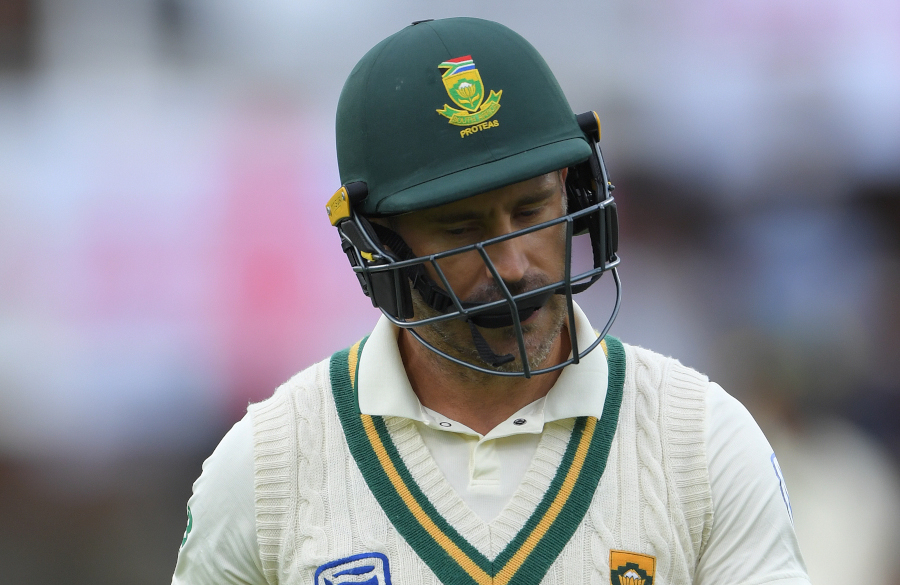This is what a medieval siege must have felt like. The enemy have your stone-walled town surrounded. Citizens have already resorted to eating rats. Disease and lethargy and boredom and fear have swirled to concoct a noxious potion. Hope has faded. The bells toll, writes DANIEL GALLAN.
South Africa began the day with four first innings wickets intact. One belonged to Quinton de Kock who was at his swashbuckling best the night before and on 63. The other belonged to Vernon Philander who looked up for the fight on 27.
England’s trebuchets Stuart Broad and Sam Curran were well supplied with a ball only two overs old and were ready to let loose. To withstand the assault, South Africa would need to fortify the trenches, shore up their defence and brace for impact. They did the opposite.
In the first over Philander planted his foot down the pitch, unfurled a flamboyant drive and had his off-stump sent cartwheeling by Broad.
In the second over De Kock strode forward, looked to lash one on the up and had his middle-stump pegged back by Curran.
Two senior cricketers with 108 Test caps between them. Two senior cricketers who looked at the scorecard and failed to recognise that their side needed sustained resistance, not self-sacrificing decadence. Two senior cricketers who tossed their wickets away as if they meant nothing.
Keshav Maharaj was even more reckless in the third over, swinging his bat as if he really were in a sword and shield fight. It was as unattractive as it was irresponsible and Broad was gifted another when the ball made a mess of the stumps via a bottom edge.
New magazine issue: Why De Kock must bat at four
England’s first innings score of 499/9 declared, which included two centurions in Ben Stokes and Ollie Pope, dwarfed South Africa’s reply of 209. The Proteas had added just the solitary run, courtesy of Kagiso Rabada, to their overnight score.
Joe Root delighted in asking South Africa to unpack their batting gear once again and follow on. This British general was not about to relent.
In the 17th Century the Ottoman Turks kept the Venetian-ruled city of Candia under siege for 21 years. Faf du Plessis and Mark Boucher did not need their batters to last as long as that, but they would have hoped opener Dean Elgar survived beyond 8.1 overs. Mark Wood’s extra pace burst through the lefty often described as ‘gritty’ and the rout was on.
Zubayr Hamza was welcomed to the crease with a bouncer. Even from the safety of the press box it was clear he was scared. Not necessarily by the searing heat of Wood’s artillery, but by the grandiosity of the occasion, of being a 24 year old in his fifth match with recent scores of 10, 18, 5, 4 and 39 to his name this series. Of being asked to do the impossible.
Wood said that the the English had identified a weakness against the short ball. The psychological hold a fast bowler has over someone who doesn’t fancy it can often manifest in overt ways. Bulging eyes and twitchy hands betrayed Hamza’s confident tapping of his bat. The tickle down the leg side off his 12th delivery faced felt like an act of mercy.
When German officers were told of the lionhearted bravery and skill of their English adversaries during the First World War, they responded with disdain. They may have fought like Lions, but they were led by donkeys.
Du Plessis is no donkey. He is as courageous as they come, an astute student of the game and a man who looks visibly jaded by a tumultuous year that almost none of us can comprehend. No other country asks of its sporting captains the way we do in South Africa. Not only must they coalesce a group of strangers into a winning team but they must also deal with the important politics of this fractured land.
In 2019 Du Plessis became the first South Africa captain to lose a Test series at home to an Asian country. He presided over the worst ever 50 over World Cup. He captained the Test team through a horror show in India. He watched as his best mate AB de Villiers toyed with the Proteas like an ambivalent lover. He watched the players’ union take the governing body to court. He watched the coaching staff change three times. He has had to score runs with his right hand and keep the wolves at bay with his left. Who among us would continue to hold our chin high after all that?
The skipper had built his reputation on famous batting marathons and he seemed to be in good rhythm today. Joe Root was made to look like so much more than a part-timer and had already removed Pieter Malan, Rassie van der Dussen and De Kock when he found the inside edge of his opposite number. The ball ballooned to Pope at short leg and Du Plessis was out for 36 off 123 balls.
Except Du Plessis reviewed the decision, baffling all within this old ground. Was this a sign that he had finally cracked? Was it a desperate attempt to keep the city sackers at bay for just a little longer? In the fading light South Africa’s chances of a rescue act faded too as Du Plessis trudged off the field. Some will hope for the final time. His two trips to the crease at the Wanderers may be his last in white.
Philander will resume tomorrow on 13 with Maharaj alongside him on 5. England need four wickets. Unless the predicted rain falls the entire day, the match will end in an innings triumph.
The enemy are closing in. They’re brandishing their arms. They’ve started ramming the gate. The end is inevitable. It’s just a matter of time.







